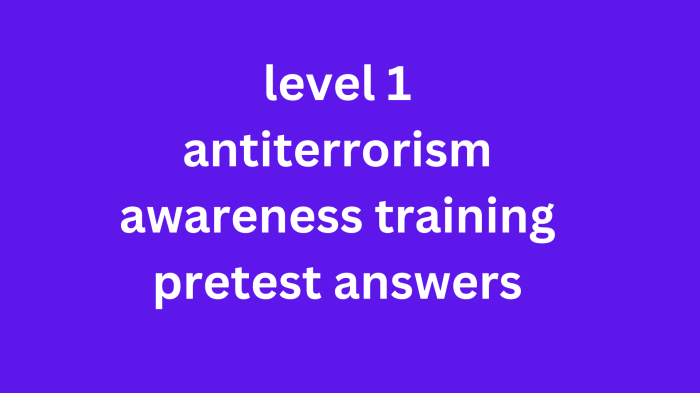Antiterrorism Level 1 Pretest Answers: Embark on a journey to comprehend the intricacies of counterterrorism measures and equip yourself with the knowledge to navigate real-world antiterrorism scenarios with confidence. This guide delves into the purpose, structure, and content of the Antiterrorism Level 1 Pretest, empowering you to excel in your preparation and enhance your understanding of the crucial skills required in the fight against terrorism.
The Antiterrorism Level 1 Pretest serves as a critical assessment tool, evaluating your knowledge and abilities in recognizing and responding to potential terrorist threats. By understanding the scope of the pretest and the competencies it measures, you can tailor your preparation strategies to maximize your performance and demonstrate your proficiency in this essential area of security.
Antiterrorism Level 1 Pretest Overview

The Antiterrorism Level 1 Pretest serves as an initial assessment tool designed to gauge the knowledge and understanding of individuals regarding fundamental antiterrorism concepts and measures. By participating in the pretest, individuals can evaluate their current level of preparedness and identify areas where further training and development may be necessary.
The pretest is primarily intended for individuals who are involved in or aspire to engage in antiterrorism efforts, including law enforcement personnel, intelligence analysts, emergency responders, and other professionals working in related fields. To be eligible for taking the pretest, individuals should possess a basic understanding of terrorism and its various manifestations.
Content Coverage and Structure

The Antiterrorism Level 1 Pretest assesses candidates’ knowledge and understanding of fundamental antiterrorism concepts and measures.
The pretest comprises a total of 50 multiple-choice questions, each with four possible answer choices. Candidates are given 60 minutes to complete the pretest.
Question Types
The pretest questions cover a wide range of topics related to antiterrorism, including:
- Terrorism definitions and characteristics
- Terrorist motivations and tactics
- Counterterrorism strategies and measures
- Roles and responsibilities of various stakeholders in counterterrorism
- Legal and ethical considerations in counterterrorism
Knowledge and Skills Assessed: Antiterrorism Level 1 Pretest Answers

The Antiterrorism Level 1 Pretest assesses a range of knowledge and skills that are critical for individuals working in the field of antiterrorism.
These skills include:
Understanding of Terrorism and Its Impacts
- Definition and nature of terrorism
- Historical and contemporary trends in terrorism
- Types and motivations of terrorist organizations
- Consequences and impacts of terrorism on individuals, communities, and nations
Threat Identification and Assessment
- Methods of identifying and assessing terrorist threats
- Types of terrorist threats and their characteristics
- Indicators of potential terrorist activity
- Techniques for threat analysis and prediction
Prevention and Mitigation Strategies, Antiterrorism level 1 pretest answers
- Principles of terrorism prevention and mitigation
- Role of law enforcement, intelligence agencies, and other stakeholders in preventing terrorism
- Best practices for developing and implementing counterterrorism programs
- Strategies for addressing the root causes of terrorism
Incident Response and Management
- Procedures for responding to terrorist incidents
- Coordination and cooperation among different agencies and organizations
- Tactics and techniques for managing terrorist incidents
- Strategies for minimizing casualties and damage
Importance of Skills in Real-World Antiterrorism Scenarios
The skills assessed by the Antiterrorism Level 1 Pretest are essential for individuals working in the field of antiterrorism. These skills enable professionals to:
- Identify and assess terrorist threats accurately
- Develop and implement effective prevention and mitigation strategies
- Respond to terrorist incidents swiftly and effectively
- Minimize casualties and damage during terrorist incidents
- Coordinate and cooperate with different agencies and organizations involved in antiterrorism efforts
Preparation and Study Materials

Effective preparation for the Antiterrorism Level 1 Pretest is crucial for success. This section provides tips and strategies to help candidates maximize their preparation and a list of recommended study materials and resources.
Tips and Strategies for Effective Preparation
- Familiarize yourself with the test format and content:Understand the structure, time limits, and topics covered in the pretest.
- Create a study plan:Establish a structured study schedule that allocates sufficient time for each topic.
- Use a variety of study methods:Engage in active learning techniques such as reading, reviewing notes, taking practice tests, and discussing the material with peers.
- Practice time management:Take timed practice tests to improve your ability to complete the pretest within the allotted time.
- Stay updated with current events:Antiterrorism involves understanding current threats and trends, so it is important to stay informed.
li> Focus on comprehension, not memorization:Aim to understand the concepts thoroughly rather than simply memorizing facts.
Recommended Study Materials and Resources
- Official Antiterrorism Level 1 Pretest Study Guide:Published by the Transportation Security Administration (TSA), this guide provides comprehensive coverage of the test content.
- Antiterrorism Level 1 Pretest Practice Questions:Available online or through study materials, practice questions help candidates assess their understanding and identify areas for improvement.
- News and Media:Stay informed about current events related to terrorism and counterterrorism through reputable news sources and media outlets.
- Training and Courses:Consider attending antiterrorism training or courses offered by government agencies or private organizations.
Sample Questions and Answers
The Antiterrorism Level 1 Pretest consists of a variety of questions designed to assess knowledge and skills related to terrorism prevention and response. The following table provides sample questions and answers to give you an idea of the format and content of the pretest.
Explanation:The correct answers are based on the official Antiterrorism Level 1 training materials and best practices in terrorism prevention and response.
Question 1
- What is the primary goal of terrorism?
- Answer:Instill fear and coerce governments or societies to meet their demands.
Question 2
- What are the four phases of the terrorist attack cycle?
- Answer:Planning, preparation, execution, and exploitation.
Question 3
- What is the role of law enforcement in terrorism prevention?
- Answer:To gather intelligence, disrupt terrorist activities, and apprehend suspects.
Question 4
- What are the key elements of a threat assessment?
- Answer:Capability, intent, and timing.
Question 5
- What is the importance of interagency cooperation in counterterrorism?
- Answer:To share information, coordinate resources, and develop a comprehensive response to terrorism.
Scoring and Interpretation
The Antiterrorism Level 1 Pretest uses a scoring system to evaluate the test taker’s knowledge and skills in antiterrorism. The test is scored based on the number of correct answers. Each correct answer is worth one point. The total score is calculated by adding up the number of correct answers.The
test results are interpreted by comparing the test taker’s score to the established passing score. The passing score is determined by the organization administering the test. A test taker who scores at or above the passing score is considered to have passed the test.
A test taker who scores below the passing score is considered to have failed the test.In addition to the overall score, the test results can also be used to identify areas for improvement. The test taker can review the questions that they answered incorrectly to identify the areas where they need to improve their knowledge and skills.
The scoring system for the Antiterrorism Level 1 Pretest is designed to be fair and accurate. The test is scored by a computer, which eliminates the possibility of human error. The test results are also reviewed by a human reviewer to ensure that the test was scored correctly.
FAQ Insights
What is the purpose of the Antiterrorism Level 1 Pretest?
The Antiterrorism Level 1 Pretest assesses your knowledge and skills in identifying and responding to potential terrorist threats.
Who is eligible to take the Antiterrorism Level 1 Pretest?
Eligibility criteria and target audience information for the Antiterrorism Level 1 Pretest can be found in the official guidelines.
What topics are covered in the Antiterrorism Level 1 Pretest?
The Antiterrorism Level 1 Pretest covers a range of topics related to terrorism, including threat identification, risk assessment, and response strategies.
How can I prepare for the Antiterrorism Level 1 Pretest?
Effective preparation involves familiarizing yourself with the pretest content, utilizing recommended study materials, and practicing sample questions.
How is the Antiterrorism Level 1 Pretest scored?
Scoring details and interpretation guidelines for the Antiterrorism Level 1 Pretest can be found in the official testing materials.